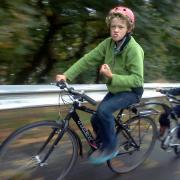 We love it when Safe Routes to School volunteers and champions share what is happening in their community with us!
We love it when Safe Routes to School volunteers and champions share what is happening in their community with us!
Resource Library
The Indiana Safe Routes to School program is alive and well! Having completed six application rounds since its inception in 2006, there are now 114 infrastructure projects and non-infrastructure activities that have been awarded funding in the Hoosier State. For a map of Indiana’s Safe Routes to School awards click here.
 Safe Routes to School is about walking and bicycling to school and in communities. The Safe Routes to School momentum spreads to players at all levels. There are only three communities with designated Safe Routes to School coordinators in the Greater Washington, DC region.
Safe Routes to School is about walking and bicycling to school and in communities. The Safe Routes to School momentum spreads to players at all levels. There are only three communities with designated Safe Routes to School coordinators in the Greater Washington, DC region.
Since 2017, the Safe Routes Partnership has partnered with community-based organizations, government agencies, and other national partners to improve local park access via walking and biking. In those seven years, we have shown that there is significant demand to unlock the full potential of neighborhood parks for health and community building by activating the routes to them. Along the way, this movement has highlighted the power of engaging parks and recreation stakeholders in creating safer, more equitable streets, ensuring that parks are integral to connected, thriving communities.
 This week, Congress is voting on a new two-year transportation bill, called MAP-21, that will make significant changes to federal transportation policy that negatively impact bicycling and walking programs. Please see our joint statement with the America Bikes coalition for information on the effec
This week, Congress is voting on a new two-year transportation bill, called MAP-21, that will make significant changes to federal transportation policy that negatively impact bicycling and walking programs. Please see our joint statement with the America Bikes coalition for information on the effec
 Since Congress released their new MAP-21 Transportation Bill two weeks ago, which eliminated dedicated funding for Safe Routes to School and leaves most of the decision making for active transportation up to states and locals, people have been asking me “what’s next?”
Since Congress released their new MAP-21 Transportation Bill two weeks ago, which eliminated dedicated funding for Safe Routes to School and leaves most of the decision making for active transportation up to states and locals, people have been asking me “what’s next?”

 I have been thinking a lot about how we can ensure Safe Routes to School, walking and bicycling can continue to flourish around the country in our new “MAP-21” world without dedicated funding. So I’ve pulled together a “top 10” list for how Safe Routes to School can survive and thrive.
I have been thinking a lot about how we can ensure Safe Routes to School, walking and bicycling can continue to flourish around the country in our new “MAP-21” world without dedicated funding. So I’ve pulled together a “top 10” list for how Safe Routes to School can survive and thrive.
 It is back to school time in North Carolina and time for an IF/THEN deductive reasoning lesson that will make a difference for all moms, dads and kids heading back to school. Here are three important IF’s and THEN’s
It is back to school time in North Carolina and time for an IF/THEN deductive reasoning lesson that will make a difference for all moms, dads and kids heading back to school. Here are three important IF’s and THEN’s

 The Safe Routes to School Mississippi network prides itself on the ability to connect with those organizations within the state that are passionate about ridding the state of the childhood obesity epidemic.
The Safe Routes to School Mississippi network prides itself on the ability to connect with those organizations within the state that are passionate about ridding the state of the childhood obesity epidemic.
This webinar provides an overview of technical assistance, resources and funding for Safe Routes to School provided by the Safe Routes Partnership.
 There is a scene, from a once famous movie where this guy busts through the door to expel his undying affection for a woman. She completes him, and he wants to make sure she knows it.
There is a scene, from a once famous movie where this guy busts through the door to expel his undying affection for a woman. She completes him, and he wants to make sure she knows it.
I’m no Tom Cruise, but I want you to know: You complete me.
 The Safe Routes to School Mississippi network prides itself on the ability to connect with those organizations within the state that are passionate about ridding the state of the childhood obesity epidemic. We continue our efforts in expanding our parameters to partners that are champions for the cause. While attending a meeting with the Obesity Coalition (formulated by The Partn
The Safe Routes to School Mississippi network prides itself on the ability to connect with those organizations within the state that are passionate about ridding the state of the childhood obesity epidemic. We continue our efforts in expanding our parameters to partners that are champions for the cause. While attending a meeting with the Obesity Coalition (formulated by The Partn

 We travel just over two miles to school each day with our two boys - by bike, of course, most days. I am proud that my ten-year old son is now riding his six-year old brother to school on a tag-along! Both boys insist on it now. This picture shows the Big Guy showing off his tough guy face on a recent school trip.
We travel just over two miles to school each day with our two boys - by bike, of course, most days. I am proud that my ten-year old son is now riding his six-year old brother to school on a tag-along! Both boys insist on it now. This picture shows the Big Guy showing off his tough guy face on a recent school trip.
 The past several months have been rife with debates, campaign speeches and rallies supporting certain candidates, ideologies and policies. Over the past couple of weeks, many Americans have exercised their right to vote into office the state and local leaders of their choice as well as the President of the United States of America.
The past several months have been rife with debates, campaign speeches and rallies supporting certain candidates, ideologies and policies. Over the past couple of weeks, many Americans have exercised their right to vote into office the state and local leaders of their choice as well as the President of the United States of America.
To date, Georgia Safe Routes to School has awarded 48 projects (totaling approximately $18.5 million). Some examples of the various types of infrastructure projects are installation of sidewalks, multi-use paths, crosswalks, raised crosswalks, multi-use paths, LED crossing signs, ADA ramps, bike lanes and bike racks.
This report highlights factors across states that are critical to campaigns for transportation funding and provides examples of successful strategies and tactics.
 Right now my work in the Bay Area region is at a very exciting phase. While earlier in the year our efforts were concentrated on our metropolitan planning organization (MPO)—the Metropolitan Transportation Commission (MTC)—our work now needs to focus on the nine counties of the San Francisco Bay Area.
Right now my work in the Bay Area region is at a very exciting phase. While earlier in the year our efforts were concentrated on our metropolitan planning organization (MPO)—the Metropolitan Transportation Commission (MTC)—our work now needs to focus on the nine counties of the San Francisco Bay Area.

